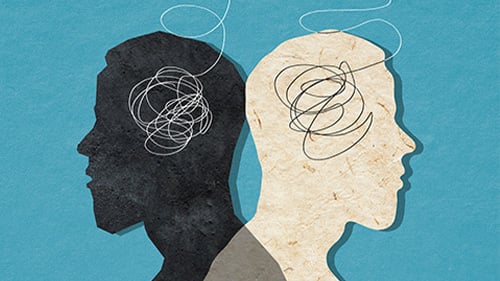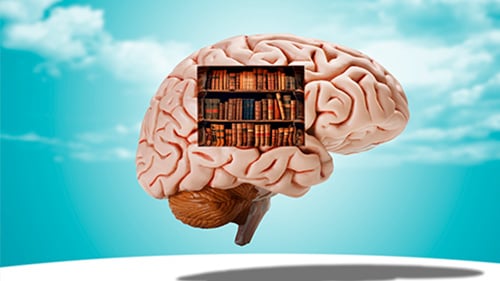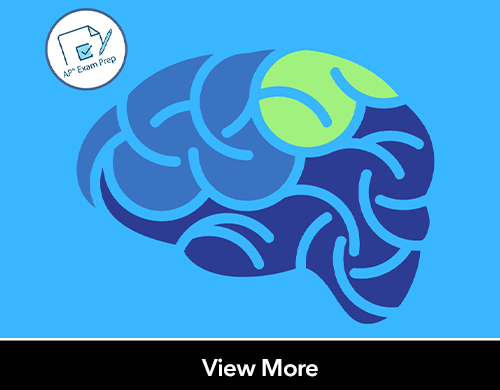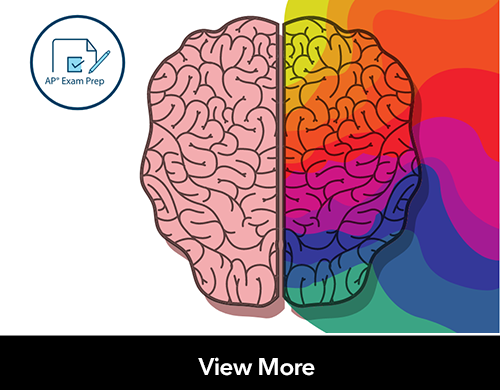Research as the focus of the AP Psychology Exam
This year’s AP Psychology Exam will be the first exam with the new curriculum which focuses intensely on research. Some may wonder about this focus...
AP & Honors Mathematics
Explore Wiley titles to support both AP and Honors mathematics instruction.
Literacy Skills & Intensive Reading
Connections: Reading – Grades 6–12
Empower student success with a proven intensive reading program that develops strong reading skills in striving readers.
Drama, Speech & Debate
Basic Drama Projects 10th Edition
Build students’ confidence and competence with comprehensive, project-based theatre instruction.
Literature
Connections: Literature
Support learners as they study dynamic, relevant texts and bring the richness of diverse voices to students through literature.
Literature & Thought
Develop critical thinking, reading, and writing across literacy themes, genres, historical eras, and current events.
Language Arts
Vocabu-Lit® – Grades 6–12
Help students build word power using high-quality contemporary and classic literature, nonfiction, essays, and more.
Connections: Writing & Language
Help students develop grammar, usage, mechanics, vocabulary, spelling, and writing and editing skills.
Reading/English Language Arts
Measuring Up to the English Language Arts Standards
Incorporate standards-driven teaching strategies to complement your ELA curriculum.
English Language Learners
Measuring Up for English Language Learners
Incorporate research-based best practices for ELLs with an approach that includes a focus on language acquisition strategies.
Mathematics
Measuring Up to the Mathematics Standards
Incorporate standards-driven teaching strategies to complement your mathematics curriculum.
Foundations
Measuring Up Foundations
Help students master foundational math skills that are critical for students to find academic success.
Science
Measuring Up to the Next Generation Science Standards
Give students comprehensive NGSS coverage while targeting instruction and providing rigorous standards practice.
Assessment
Measuring Up Live
Deliver innovative assessment and practice technology designed to offer data-driven instructional support.
For a better website experience, please confirm you are in:
2 min read
Laura Brandt, M.A. Psychology and U.S. History Apr 7, 2025 7:15:00 AM

Review season is upon us. With preparations for upcoming AP exams, finals, and other year-end assessments principals in cognitive science can help students study more efficiently and effectively. This post will explain some of these techniques and contrast them with less effective and more time-consuming approaches to studying that are often used by students.
Instead of using rote repetition in order to memorize terms and concepts, try to apply terms and concepts to their everyday lives. This provides for a deeper level of processing and will help students understand the application of concepts rather than just trying to remember a definition, which is easily forgotten. To do this, students can ask themselves what else they know about this concept, what it relates to or reminds them of, this will then give them more to retrieve when trying to bring back the information at a later time.
Instead of studying units in isolation, students should try to find connections between concepts and see how one term, theory, or concept builds upon or relates to other concepts. This process is known as interleaving and helps students to understand the broad connections between different areas of a discipline. Interleaving aids in retrieval and helps to understand the complexities of topics, as understanding the connections between topics also helps to better understand a discipline as a whole.
Instead of trying to remember long lists or step-by-step procedures, students should use a mnemonic device. Some straight memorization may be necessary for some courses, trying to remember a long list of words is often difficult, but can be made easier if utilizing a mnemonic (named after the Greek goddess of Mnemosyne). Students are likely familiar with some mnemonics already, such as HOMES to remember the names of the Great Lakes, or ROGIBIV to remember the colors of the rainbow. Not all mnemonics are acronyms. For example, when trying to remember that Broca’s area in the brain is for speech production, it may help to connect this to the word Bocca, which in Italian means mouth, which is also integral to the production of speech. For mnemonics to be most effective, students should use them from the beginning of the learning process.
Instead of reviewing material that students like best and have nearly mastered, they should try to identify those areas in which they have experienced the largest struggle because these areas will allow for the largest increase in learning. Study what was difficult because increasing understanding in this area will allow for the most growth. Students often have the impression that when learning is easy, it is best, but research demonstrates that a productive struggle results in the most learning.
Instead of reading a textbook or notes over and over again, it is better if students test themselves on what they know. The more the questions can mimic the exam they are preparing for, the better. The testing effect works for a number of reasons. First, it provides students with practice, and just like in a sport, practice helps improve performance when it matters. Whether it is a test or a competition, having more experience with what to expect should increase performance. The testing effect also helps students to identify the areas in which they need further practice.
The processes of elaborative rehearsal, interleaving, mnemonic devices, studying what is difficult, and the testing effect are all techniques that are backed by cognitive science. These are research-based techniques that provide the best outcomes.
Good luck to all students on their upcoming exams!

This year’s AP Psychology Exam will be the first exam with the new curriculum which focuses intensely on research. Some may wonder about this focus...

As the AP® exam draws near, students often become increasingly anxious. Review games and activities can target areas students need to review while...

The Long Essay Question (LEQ) on the AP U.S. History exam offers students an opportunity to construct a sophisticated historical argument, supported...

The Secondary Source Short Answer Question (SAQ) on the AP history exam presents a unique challenge: students must analyze and synthesize historical...

You may have heard about the “Irish” Thesis Formula—it is all over the internet. Some teachers like it, others hate it, but whatever you think about...

One of the things that I spent most of my time thinking about, when the redesigned AP U.S. History course went into effect, was how to deal with the...

It’s the time of year when teachers and students begin their final push towards preparing for the AP Human Geography exam. Teachers and students...

The free-response section in the AP Psychology exam contains two seven-point questions that are weighted to account for a third of the overall exam...

Let’s face it, poorly answered free response questions are hard on both teachers and students. Most students shudder at the thought of answering the...

From a practical point of view, argumentation is at the heart of the free response section of the AP exam. This can be particularly difficult with...

The argumentative essay question on the AP U.S. Government and Politics exam demands a synthesis of content knowledge, analytical skill, and...

This blog entry is designed to provide some hints to help your students improve their writing on the free-response section of the exam. The...
